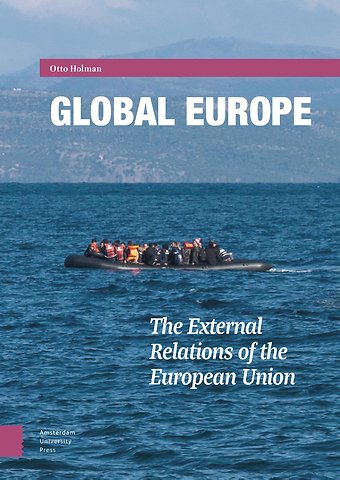Global Europe
The External Relations of the European Union
E-book Pdf met watermerkbeveiliging Engels 2019 1e druk 9789048536467Samenvatting
The European Union is facing the worst existential crisis in its 60-year history. At the same time, it is confronted with old and new challenges in its environment that call for joint action.
But how do matters stand with the EU's capacity to act? Does the EU manage to effectively combine the different components of its external relations-such as trade, development aid, and security policy-better than it did in the past? How is the EU's external action determined by the internal socio-economic and political crises in its member states?
These questions and more are answered in Global Europe in the context of the current impasse in the integration process. A clear analysis of the history of the EU's external relations up to now provides us with a better insight into the feasibility of EU strategies directed at the outside world.
Specificaties
Lezersrecensies
Inhoudsopgave
U kunt van deze inhoudsopgave een PDF downloaden
Preface 11
1. Introduction 21
Theory formation at the intersection of international relations and European integration studies
1.1. A brief history of the EU’s external relations 23
1.2. Approaches within the field of international relations 26
1.3. European integration theories 31
1.4. Conclusion 41
Suggestions for further reading 42
2. Foreign policy theories and the external relations of the European Union 45
Factors and actors
2.1. The study of foreign policy 48
2.2. The EU as an actor in the world: internal power and external power 64
2.3. Conclusion 67
Suggestions for further reading 68
3. The European Union’s trade policy 71
3.1. The EU as a power factor (and actor) in international relations 72
3.1.1. The remarkable renaissance of the superpower thesis 73
3.1.2. The proliferation of adjectives: power as a grab bag 76
3.2. EU trade policy 80
3.2.1. The EU as a trading state and as an external power: who are the principals and who are the agents? 83
3.2.2. The partnership between the European Commission and European business: commercial internationalism explained 86
3.3. Case study I: the TTIP as a source of (trans)national conflict 91
3.4. Case study II: the Common Agricultural Policy and the Janus face of the EU 96
3.5. Conclusion 101
Suggestions for further reading 102
4. Decolonisation and enlargement: the European Union’s development policy 103
4.1. A brief history of the EU’s development policy 104
4.2. The most important characteristics of EU development policy since the Cotonou Treaty (2000) 111
4.2.1. The development of development theory: from hope to nihilism? 113
4.2.2. Trade and aid: Two sides of the same coin? 119
4.3. EU actorness and the position of development policy in EU external relations: challenges or contradictions? 125
4.4. Conclusion 131
Suggestions for further reading 132
5. The end of the Cold War , the enlargement strategy, and the European Union’s Neighbourhood Policy 133
5.1. Deepening or widening, enlargement and disintegration? 135
5.1.1. Previous enlargement rounds and the dynamics of deeper integration 137
5.1.2. Big bang enlargement in comparative perspective 140
5.2. The EU as transformative power? 147
5.3. Beyond big bang enlargement: dilemmas of a larger Europe 154
5.3.1. Enlargement and Euroscepticism: incompatible quantities? 155
5.3.2. Beyond conditionality: the spectre of populism 158
5.3.3. Enlargement as security strategy: the EU and the Western Balkans 161
5.4. The new neighbours as friends: the Neighbourhood Policy 164
5.5. Conclusion 168
Suggestions for further reading 169
6. Internal-external 171
Security in a liberal and multipolar world order
6.1. European integration and Atlantic security during the Cold War 173
6.2. The trans-Atlantic impasse: EU-US relations after the Cold War 177
6.2.1. Hegemonic stability under fire 178
6.2.2. Towards a post-American Europe? 180
6.3. New security threats and old reflexes 186
6.4. European security and defence policy 190
6.4.1. A brief history of the CSDP 191
6.4.2. The Global Strategy of the European Union and the CSDP 194
6.4.3. Factors and actors 200
6.5. Towards a multipolar world? Changing power relations in the international system 204
6.6. Conclusion 207
Suggestions for further reading 208
Epilogue 211
Notes 219
Bibliography 233
Index 241
Anderen die dit e-book kochten, kochten ook
Rubrieken
- advisering
- algemeen management
- coaching en trainen
- communicatie en media
- economie
- financieel management
- inkoop en logistiek
- internet en social media
- it-management / ict
- juridisch
- leiderschap
- marketing
- mens en maatschappij
- non-profit
- ondernemen
- organisatiekunde
- personal finance
- personeelsmanagement
- persoonlijke effectiviteit
- projectmanagement
- psychologie
- reclame en verkoop
- strategisch management
- verandermanagement
- werk en loopbaan








